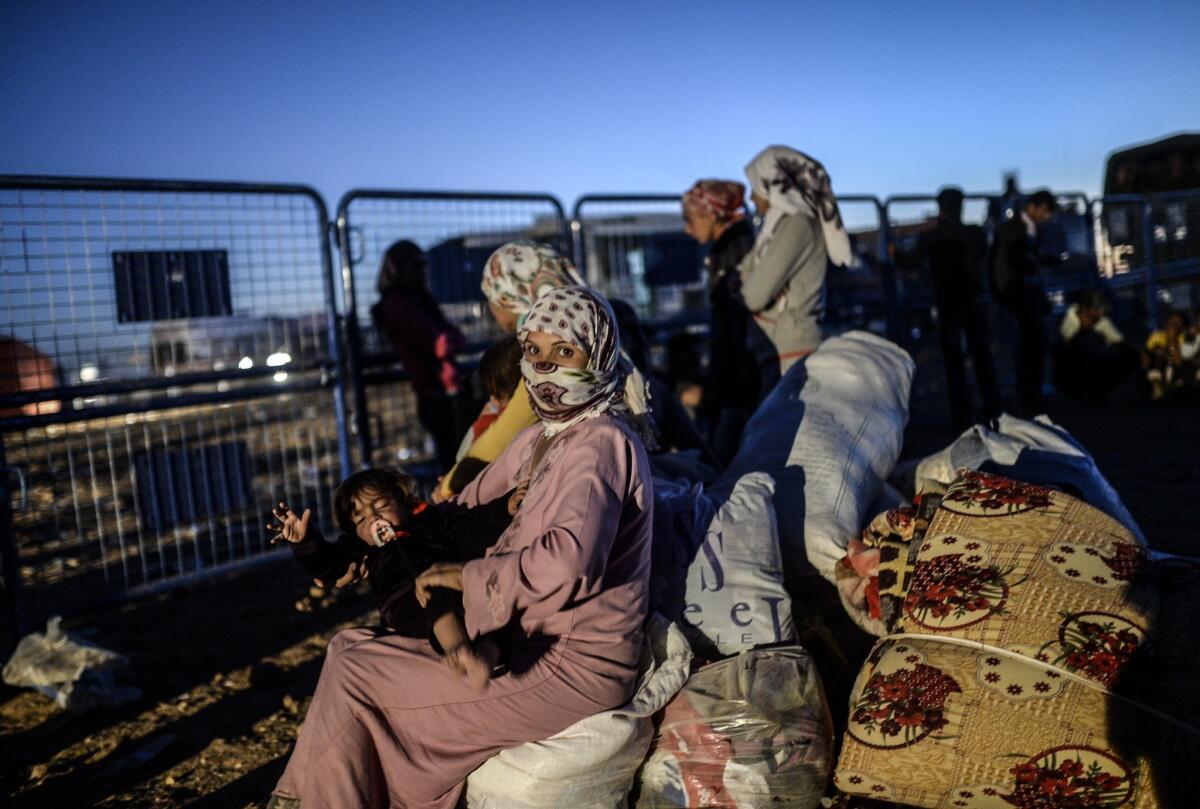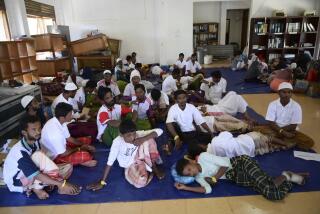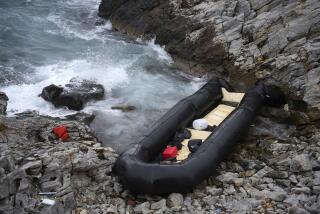Thousands of Syrian refugees flood Turkey after fleeing Islamic State

The number of Syrians fleeing from Islamist militants and entering into Turkey in recent days has exceeded 130,000, making the flight one of the largest refugee flows to date during the Syrian conflict, the United Nations said Monday.
“In Turkey we have never witnessed such big numbers in a few days’ time,” Selin Unal, spokeswoman for the U.N. refugee agency, said in a telephone interview from Ankara.
Most of the refugees are Syrian Kurds fleeing an offensive by the Islamic State, the Al Qaeda breakaway group formerly known as the Islamic State of Iraq and Syria, or ISIS. The flight of refugees was continuing on Monday, the U.N. said, but the numbers appeared to be less than during the weekend.
Islamic State militants, advancing along several fronts in northern Syria, have reportedly overrun more than two dozen mostly Kurdish villages, prompting terrified residents to abandon their homes. Kurdish officials say the Arab extremists are determined to carry out a program of “ethnic cleansing” in the Kurdish region of northern Syria.
The latest refugee push into Turkey began on Friday once Ankara opened its borders after initially refusing entry to the Syrians. Protesters on the Turkish side clashed with Turkish authorities, demanding that the displaced multitudes be allowed entry. The Turkish government eventually relented and permitted the Syrians into Turkish territory.
Many have found shelter with Kurdish kin on the Turkish side, the U.N. said. Others are staying at transit camps along the isolated and barren stretch of border. Turkish authorities and the U.N. are providing food, shelter, medical care and other needs. The U.N. is calling for additional support from outside donors.
The current exodus is among the largest during the more than three-year Syrian war, which has seen in excess of 3 million Syrians flee their homeland, mostly to Turkey and other neighboring nations, including Jordan, Lebanon and Iraq. The influx has severely stretched resources and exacerbated social and political tensions in the nations hosting the refugees.
The Syrian conflict has also spread to Iraq, displacing huge numbers of individuals.
In August, authorities said more than 200,000 people -- mostly Kurdish-speaking members of the Yazidi religious sect but also many Christians, Shiite Muslims and others -- fled their homes in Iraq in fear of advancing forces of the Islamic State. The Sunni Muslim militant group embraces an ultra-fundamentalist doctrine and has become notorious for executing those whom it labels “infidels.”
The latest Syrian refugees are fleeing an Islamic State advance toward the Syrian border town of Ayn-al-Arab, known as Kobane in Kurdish. The town and surrounding region have long been under the control of Syrian Kurdish militiamen known as the Popular Protection Units. Syrian government forces mostly left the area more than two years ago, leaving the Kurds to arrange for their own security.
The Syrian Kurdish fighters, who embrace a secular, left-wing ideology, have long been arch-enemies of the Islamic militants. The Kurds have beaten back the extremists on several fronts in nothern Syria, but say their forces in Syria lack arms and equipment and have not received much external aid, except from fellow Kurds in Turkey.
Meantime, Islamic State forces have seized vast stocks of weaponry from Iraqi and Syrian arms depots, including tanks and heavy artillery, and are awash in cash from oil-smuggling operations. The militants control a vast stretch of territory in Syria and neighboring Iraq.
Kurdish authorities across the region have issued a call to arms for volunteers to help blunt the extremist advance in northern Syria. Some fighters from the Kurdistan Workers’ Party, known as the PKK, after its Kurdish acronym, have reportedly crossed the border to aid their brethren.
But the government in Ankara and the PKK have been bitter adversaries in a three-decade conflict, complicating the situation on the ground. Both Turkey and the United States label the PKK a terrorist organization, a label rejected by the Kurds.
On Sept. 10, President Obama vowed to “degrade and ultimately destroy” the Islamic State group. U.S. forces have conducted scores of airstrikes against militant positions in Iraq, but have yet to target the group in Syria.
Twitter: @mcdneville
More to Read
Start your day right
Sign up for Essential California for news, features and recommendations from the L.A. Times and beyond in your inbox six days a week.
You may occasionally receive promotional content from the Los Angeles Times.





